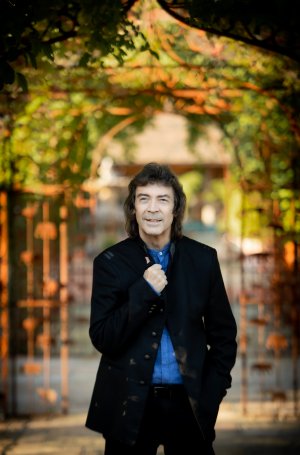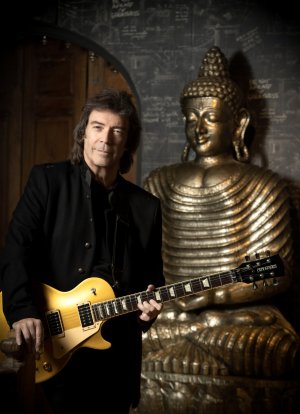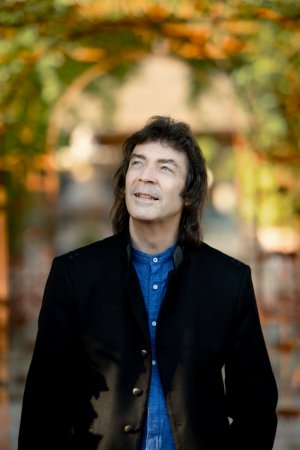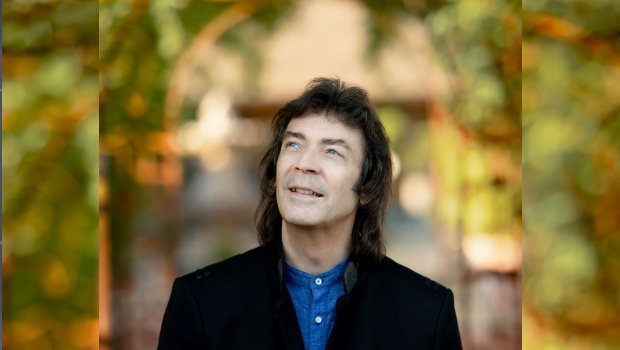On 25th January Steve Hackett will release his new studio album, At the Edge of Light, and to mark the occasion TPA’s John Wenlock-Smith had a chat with Steve about the album, his current thinking and looking ahead to his U.K. tour in October when he will be revisiting the Selling England By the Pound and Spectral Mornings albums, amongst tracks from the new album and other Hackett classics.
Good afternoon Steve, how are you?
Yes I’m well, very good, thanks it’s nice to talk again.
Let’s talk about the new album, At the Edge of Light. I have a copy, and I am thoroughly enjoying it.
Well thank you that you like it, I had a great time making it. I must say I’m still in the honeymoon period, I see no blemishes on the bride. In some ways I see it as companion piece to the last album (2017’s The Night Siren) as it has many of the same players, Jonas Reingold on bass, Malik Mansurov on tar, Rob Townsend on sax, Amanda Lehmann on vocals, Roger King on keyboards and programming, for example, but it’s really my first ‘Orchestral Album with Rock Music’. I’ve done other orchestral bits with nylon guitar and orchestra but this is the first time I have done anything like this.
Was most of the orchestration done via Roger’s keyboards?
 It’s a mix, some is Roger and some was orchestra. On the track Beasts In Our Time in various places and times we tracked it up and we kind of mix it up, we use both great players and great programming. We tend to track them up as much as they can stand and we do the same with vocals to create choirs as well, it’s a very laborious process and is probably very boring if you’re not involved really. I wouldn’t recommend it to anyone really!
It’s a mix, some is Roger and some was orchestra. On the track Beasts In Our Time in various places and times we tracked it up and we kind of mix it up, we use both great players and great programming. We tend to track them up as much as they can stand and we do the same with vocals to create choirs as well, it’s a very laborious process and is probably very boring if you’re not involved really. I wouldn’t recommend it to anyone really!
We regularly use in excess of 200 tracks and I don’t know how Roger keeps tabs on it really, he does have to stop occasionally and rationalise things. We had several computers blow up on us all the time during the making of the album. They give us a lot, but they make us suffer at the same time! I think you must make it your friend, or you’ll murder it. I love what technology brings to things these days, as Roger says, better tools than we’ve had before. Things are more convincing, but I like to use the real thing and if I can use a real person I will, but often we simply didn’t have time so used the technology to do it, but sometimes the samples sound so good. Sometimes you want it to sound cold and synthetic.
On the Beasts in Our Time your track by track notes say there is a lullaby aspect to the beginning of the song interspersed with powerful choir, Rob Townsend’s sax and your guitar before all is let loose and the beast is out. What beast are you alluding to?
Well Jo (Hackett – Steve’s wife} came up with the title and I said is it a variant and a nod to the quote by Neville Chamberlain on the eve of war about ‘Peace in Our Time’, that bankrupt statement made by Herr Hitler, and I felt that as we talk so much about populist politics and right wing manoeuvres and politicians trying to drag us back to medieval times when we have all this marvellous technology that allows us to work with the greatest and the best all over the world.
I felt we were writing a kind of protest song, we don’t name any names but for me it’s about world leaders and about that time in the 1930s and also about now. I read a book called In a Garden of Beasts by lars Erik Larson that’s about the rise of the Nazi’s, and that could have been an alternative title for the song, but rather cleverly Jo came up with the title Beasts In Our Time which raised an eyebrow or two amongst the song writing team, which I thought was clever, so it’s about now and also about then too.
I understand that because I’m very concerned about the state of this country at the present time.
Yes, well we seem to heading voluntarily to civil unrest. People were on today saying that we’re going to have to eat tinned food, why are we voluntarily jumping off this cliff? When supply cars are so important, the interdependency is huge in the age of specialisation, musicians can ignore borders and fly over them easily really, I think music can do things that politicians can’t do, like fellowship peace and goodwill.
Let’s talk about Those Golden Wings, which is a bit of an epic.
Its really a love song to Jo and it talks about her history and touches on mine, it talks about our shared experiences of getting to know each other in the early days of our relationship and of trying to make something strong with our own turbulent histories and problems at that time when we were both married to separate people.
I wanted to write a love song for something that was worthy of her and it turned into an epic, she’s a very complex persons and has always had a social conscience, storing up her sixpences as a child to send off to Oxfam, she’s always been concerned about that and we’ve just visited Ethiopia where she was doing the same thing, buying a pair of shoes for a little girl in a marketplace, those could have been the first shoes she’d ever had. She (Jo) is the same person she was as a six year old. So, I wanted to write something that was worthy of her because I have enormous respect for her. We write a lot of stuff together, she’s written several books and has done the occasional film, she’s very involved in the business we have and she doesn’t want me to do anything that undermines that or is throwaway or too casual. No bore notes, whatever they might be, as long as it’s impassioned I can come up with something that is completely pan-genre in any style, doesn’t matter if it’s country, blues, jazz or prog! If you feel it.
I think the song has an element of, almost a throwback to, the Wind and Wuthering era about it.
Well it starts orchestrally with a nod to Tchaikovsky, a bit like a scene setting mini overture at the beginning like in one of those ballets, setting the scene before the story unfolds. You mention the Genesis thing, well from the time I joined them it wasn’t unusual to be working on songs of this length, we had three a side to most of those albums if I recall. So, this allows verse, chorus, solos, introductions and the chance head off into uncharted territories, and with its orchestral bits and choral bits and an indulgent guitar solo at the end as I found the sequence inspiring to play over, you could play blues phrases, jazz phrases, rock stuff or whatever, you could play against the melody.
 The final three pieces, Descent, Conflict and Peace form a sort of trilogy.
The final three pieces, Descent, Conflict and Peace form a sort of trilogy.
Yes, they do a kind of suite or trilogy, I thought i’d explore that as an idea for bonus tracks but it came out too strong so I kept it for the album, but it was Jo who suggested making it one part of three. It was Ben Fenner who was producing it with me who said “I think we should call this Descent” as I was using the three note chords Tritones that sound like something landing, descending into the pits of hell.
The whole album has a strong World Music element to it.
Well I tried to make it as global as I could using friends from all around the globe. We’ve got to keep away from this fortress mentality, rather than those people out there who fear foreigners and look to keep out the foreign devil, it breeds unrest and a friend of mine was very badly hurt in the Paris riots, she’s recovering now thankfully. Politicians making this country great again rather than taking us back to an the caves, we’ve got all this technology that we can use to solve things, cure cancer, feed the world. Call me an idealist or whatever but the technology is there, but what’s in the way is people and politicians.
That’s me on my soapbox again, but it does get me going, politicians making statements that don’t seek to serve the people that elected them but to further their own agendas. Donald Trump’s wall for example, we don’t need this at all, the only person who wants it is him, we can cover this with drone surveillance.
So have any of the old boys heard this album yet?
What, my Genesis pals? No, I’ve not sat any of them down. I think if anyone does well it might cause a small quiver of the lip; however, it was a damn fine group, a damn fine regiment that I was a part of. Personally, if any of them do anything that impresses me I ring them and tell them “Damn fine effort!” Mike Rutherford rang me and told me he liked the Behind the Smoke video and song, and I rang him and told him I liked the first Mike and the Mechanics album, and Smallcreep’s Day. Pete’s third album I absolutely adored, great music like Biko, No Self Control and all that, and Phil’s first album was also very good. And I’ve always complemented Tony as he has such great harmonic ideas, it’s like having Mozart working with the band, he was streets ahead of everyone else harmonically. Phil was rhythmically streets ahead of everyone, no passengers in that band!
It’s a shame Phil can’t play any more though.
Yes, but he’s still out there doing it even though he said he wouldn’t, I hope there might be an improvement there.
It’d be nice to see you guys all do one more run around the block.
I Agree, it would be nice, but meanwhile I do what I do to honour the early work we did together. The stuff that John Lennon spoke of in 1973 as being one of the things he was listening to, the Selling England by the Pound album, it’s high in my own personal haul of famous things, I love that we managed to do that together, some of us were scratching our heads and others got it, I think some of the guys are surprised that it’s become so popular but I’m not remotely surprised, I thought it was a fantastic album.
Strong material.
Some songs, The Beatles are an example of this, sometimes you hear demo and you think ‘this isn’t going to work’ and then by the time it’s put together and everyone’s had their say, someone has come up with an idea that’s turned it into a rescue package and made that work, and I think that part of The Battle of Epping Forest, Pete’s contribution with the vicar coming in and all that absolute theatre carry on is just wonderful, and John Lennon’s I am The Walrus where George Martin must have thought ‘what the hell do I do with that?’, but the thing that he did with it was in operating as Beatle Number 5 and 6 in not just a rescue package but the vast detail turned it into a tour de force. It shows what can be done with something you don’t feel at one with, so you never really need to reject anything in music and those two things are perfect examples of how something can be an agent of transformation, it could be you.
I read the piece in Prog magazine about that album.
It was an interesting album created in a haphazard kind of way, the usual way in which we made albums. Pete came up with the title, I didn’t realise it was part of the Labour Party manifesto at one point, but I just thought it was full of great ideas. Great drumming from Phil, even the first track is full of great ideas, Mozart meets jazz drummer meets Elgar meets Scottish plainsong meets fusion – what an extraordinary thing, and the quietist jam with everyone playing rock instruments very quietly.
How’s the book coming along?
 Oh, well I’ve not finished it, people keep telling me I need to get on with that but I’ve been so busy doing albums and touring I really need to write it in my sleep. I need to take a year or two to write, it I shouldn’t chance my arm but you need an illness to get some time to do it.
Oh, well I’ve not finished it, people keep telling me I need to get on with that but I’ve been so busy doing albums and touring I really need to write it in my sleep. I need to take a year or two to write, it I shouldn’t chance my arm but you need an illness to get some time to do it.
You’ve got a busy year too.
I do, I do. I’m doing 150 dates in the next year.
We’re looking forward to the U.K. tour this year too, we’re going to try and get to that.
Doing the whole of Selling England, including a track I wrote with Pete that will end up on it even though it didn’t end up on the album, a director’s cut deleted scene for your delectation.
That’ll be good, we enjoyed the orchestral tour, that was great, we enjoyed that.
I enjoyed that as well, it was kind of nerve wrecking thinking ‘is it going to fly tonight?’, it was great.
We saw it in Manchester.
Did we have it down by then? I can’t remember.
It seems to be, yes, it gave extra power to the songs.
It was extraordinary, there was extra detail, they weren’t just playing the notes for the band. It’s all been recorded and will be out later in the year, I’ve heard the rushes and they sound great.
Well all the other ones have been great and we’ve got them all, so that’s one to look oust for later in the year.
Anyway Steve, our time has gone, you’re a busy man that’s needed elsewhere so it’s been great to talk to you. Keep well and best wishes for this album and tour. Thanks for talking with us.
Thanks John, good talking to you too. Take care.
[You can read John Wenlock-Smith’s review of At the Edge of Light HERE.]

